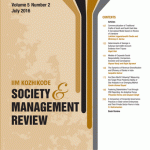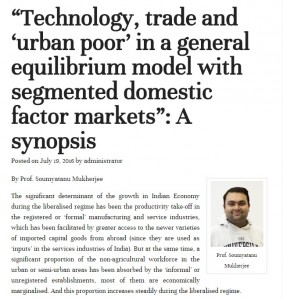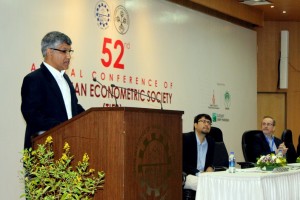Research Seminar by Prof.VG SRIDHARAN, PAUL CORAM & YALIN HAN
A research Seminar was conducted by VG SRIDHARAN, PAUL CORAM & YALIN HAN on the topic Does Incentive Compensation Motivate Senior Managers to Approve Radical New Product Development Projects? An Experimental Investigation.
The abstract of the talk is as follows,
Agency theory asserts that senior managers’ behaviours can be aligned with the firms’ goals through incentive compensation plans. The persistent evidence that stock market favours firms’ investments in research and development (R&D) is consistent with firms’ use of stock-based incentive compensation for senior managers to promote extensive R&D. However, the new product development (NPD) literature finds that stock market does not exhibit a similar favorable disposition towards firms’ high-risk radical NPD offerings (e.g., Wu et al., 2015; Jia, 2018), which raises the question about the utility of stock-based incentive compensation for promoting radical NPD. Further, given that accounting regulations (IAS-38) stipulate writing-off all radical NPD expenses in the same year of incurrence, the relevance of earnings-based incentive compensation to motivate radical NPD approvals is also questionable. Developing hypotheses to argue that both earnings- and stock-based incentive compensation plans do not motivate senior managers to approve radical NPD, we test the same by running two separate experiments. While the first examines the effects of the two incentive compensation (earnings- and stock-based) variants, the second experiment captures the effect of the control variable namely, fixed compensation. The results show that compensation variable remains significant on a comparison of earnings- or stock-based incentive compensation with fixed compensation, which confirm the hypotheses in that neither of the incentive compensation variants has little motivational effect on senior managers’ radical NPD choices. In affirming robustness, we find that the introduction of a mandatory condition in both experiments to approve a combination of radical and incremental NPD projects does not influence the main results. In our additional test, we compare the effects of the two variants of the incentive compensation and find that the difference is negligible. Overall, our collective evidence supports the theory that incentive compensation has little effect on senior managers’ decisions to approve radical projects. Our study findings hold implications for firms in the design of senior managers’ incentive structures for promoting radical NPD projects.
















 Users Today : 113
Users Today : 113 Users Yesterday : 457
Users Yesterday : 457 This Month : 5741
This Month : 5741 This Year : 5741
This Year : 5741 Total Users : 563985
Total Users : 563985 Who's Online : 2
Who's Online : 2